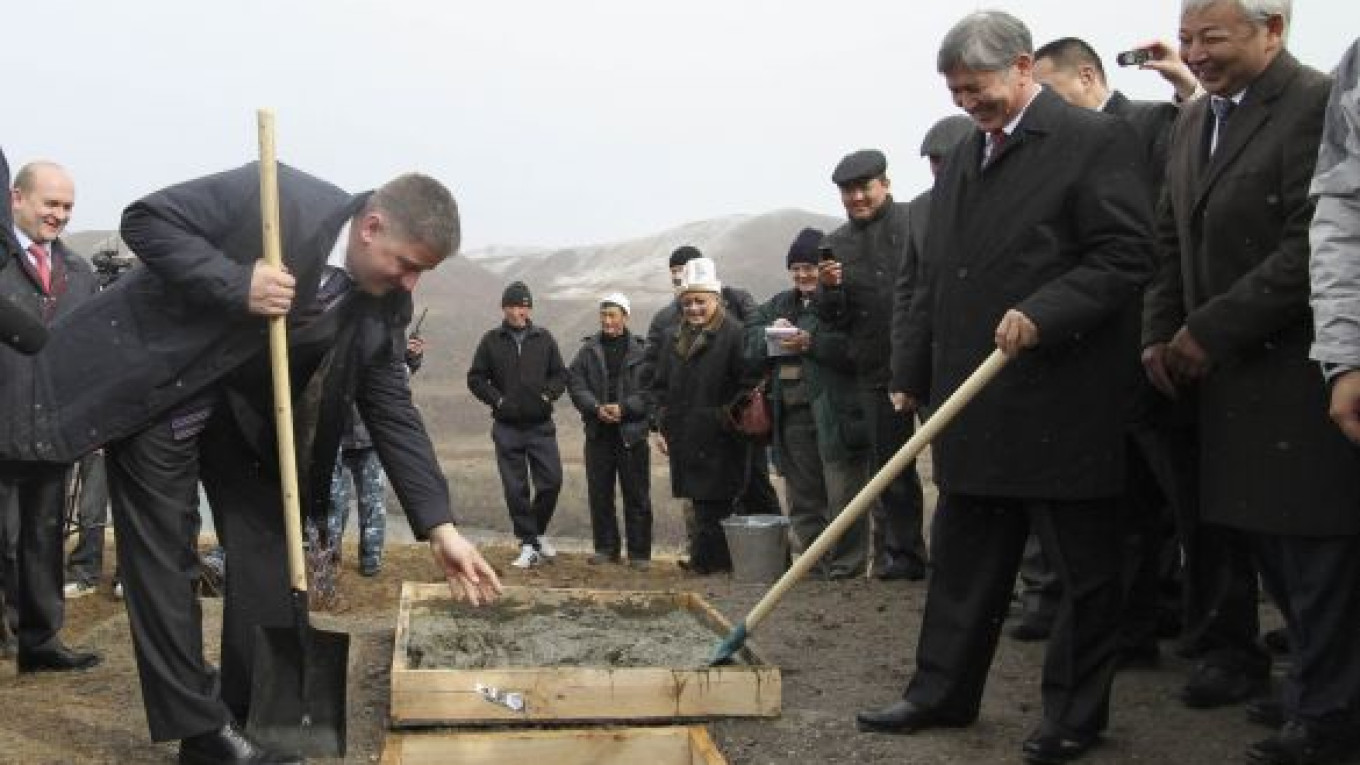Kyrgyzstan's leader welcomed growing Russian investment in his impoverished nation Saturday in a ceremony to kick off the construction? of four Russian-built hydroelectric power stations.
The power project extends the Kremlin's footprint in the volatile fringes of the former Soviet Union, following Russia's agreement to write off nearly $500 million in Kyrgyz debts.
Russian state-controlled hydroelectric power producer RusHydro will build the four plants by 2016. The deal was approved in September after Kyrgyzstan extended a lease on a Russian military base and confirmed plans to close a U.S. military base used to fly troops in and out of Afghanistan.
"Today we witness a historic event in the upper reaches of the Naryn River: For the first time since the fall of the great Soviet Union, we lay the foundation not of just a single hydropower plant, but of an entire cascade of stations," Kyrgyz President Almazbek Atambayev said at a ground-breaking ceremony.
"Great? Russia? supports us," he said to the applause of Kyrgyz officials, top RusHydro managers and local residents in the mountain-rimmed Naryn River valley.
Twenty one years after the demise of the Soviet Union, Kyrgyzstan, a mainly Muslim Central Asian nation, remains one of the poorest of the 15 former Soviet republics despite its abundant hydropower potential and other natural resources.
The country, where two presidents have been toppled in violent revolts since 2005 and per capita GDP is less than a tenth of that in next-door Kazakhstan, badly needs foreign investment to alleviate poverty that stokes instability.
The cascades of hydropower stations will have a combined annual capacity of 1.055 million kilowatt-hours. Kyrgyz officials say the construction? of the first one will begin next spring.
The plants will cost between $410 million and $425 million and will be financed on a parity basis by Kyrgyzstan and RusHydro, which would also manage 25 percent of the plants' capacity until they turn profitable.
The project, initially conceived in the Soviet era, is expected to be the first of several major energy projects set to strengthen Russia's hold in the strategic nation bordering? China? and lying on a drug trafficking route out of? Afghanistan.
"By 2016, all these four stations will have been built and we will start building another eight plants [in this area]," Atambayev said, but gave no details.
Atambayev lays foundations
In a sparsely populated valley some 400 kilometers southeast of the capital, Bishkek, Atambayev put a metal capsule with a message to future generations into the foundation of the first hydropower station. RusHydro Chairman Yevgeny Dod took off his wrist watch and cemented it with the capsule.
The Kyrgyz president, who enjoys warm relations with President Vladimir Putin, clinched the deal during the Russian leader's visit to Bishkek last month.
"Today is a significant day in Kyrgyzstan's ties with this brotherly country [Russia]," Atambayev said. "I would like to specially thank Russian President Vladimir Vladimirovich Putin for his support of this project, his political will and wisdom."
With the deal, Russia also acquires the role of mediator in Kyrgyzstan's dispute with its much bigger neighbor Uzbekistan over water use.
Uzbekistan, which lies downstream, depends on the rivers that rise in Kyrgyzstan and Tajikistan to irrigate farmland.
Uzbek leader Islam Karimov last month criticized plans by its neighbors to revive other projects, conceived in Soviet days but still unbuilt, to dam rivers and build hydropower stations: the Kambarata-1 in Kyrgyzstan and the Rogun plant in Tajikistan.
Karimov said the unresolved dispute over Central Asia's water resources risked provoking military conflict in the region.
"I believe that when we display all the facts and documents proving that the Kambarata-1 plant would primarily benefit the downstream nations, this issue will be removed," Atambayev said, inviting Uzbekistan to eventually take part in the project.
Related articles:
A Message from The Moscow Times:
Dear readers,
We are facing unprecedented challenges. Russia's Prosecutor General's Office has designated The Moscow Times as an "undesirable" organization, criminalizing our work and putting our staff at risk of prosecution. This follows our earlier unjust labeling as a "foreign agent."
These actions are direct attempts to silence independent journalism in Russia. The authorities claim our work "discredits the decisions of the Russian leadership." We see things differently: we strive to provide accurate, unbiased reporting on Russia.
We, the journalists of The Moscow Times, refuse to be silenced. But to continue our work, we need your help.
Your support, no matter how small, makes a world of difference. If you can, please support us monthly starting from just $2. It's quick to set up, and every contribution makes a significant impact.
By supporting The Moscow Times, you're defending open, independent journalism in the face of repression. Thank you for standing with us.
Remind me later.


